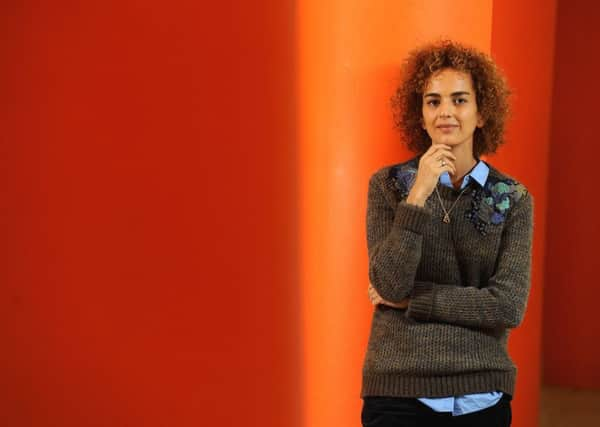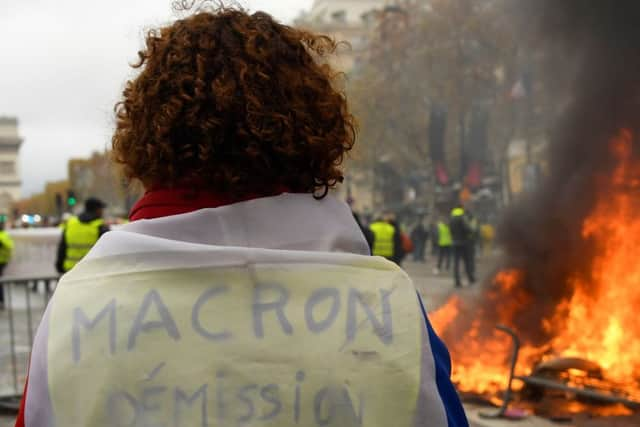Novelist Leïla Slimani: France is a little bit broken and we don't know how to fix it


Given her extraordinary recent successes that have resulted in her being acclaimed by Vanity Fair as the second most influential French person in the world, it is no surprise Leïla Slimani feels that her arrest while working as a journalist in Tunisia during the Arab Spring almost happened another lifetime ago.
“It seems very, very far away. I have the feeling it was like 20 years ago,” she tells an audience at the University of Sheffield when asked about the incident in 2010 in which she was arrested by the Tunisian army and had her computer seized, along with her photographer’s camera, as they covered the growing protests.
Advertisement
Hide AdAdvertisement
Hide AdSlimani has undoubtedly packed a lot into the eight years that have passed instead. The 37-year-old has published two novels, with her second book Lullaby – the tale of a French nanny to a wealthy Arab family which famously opens with the line ‘The baby is dead’ – selling more than 600,000 copies, being translated into 40 languages and making her the first-ever Moroccan-born winner of France’s most prestigious literary accolade, the Prix Goncourt.


She was appointed by President Macron as his personal representative in a globe-trotting role that includes being a champion of French language and culture, while also becoming a passionate advocate for women’s and LGBT rights in her home country of Morocco, where sex outside marriage, abortion and homosexuality is illegal.
“There is not a policeman behind every Moroccan but it is like a threat, you know it is a possibility,” she explains. “You know if you don’t act like people want you to act, someone could denounce you - parents, a neighbour, someone who doesn’t like you. It is like a social pressure on your shoulders. What makes me very angry is your parents tell you ‘please lie’; you are educated as a liar and you can’t be a citizen without being a liar. You can’t build an equal society when you have to lie.”
Last month, Vanity Fair placed her ahead of the President and World Cup-winning French football stars and behind only fashion designer Hedi Slimane in the global influence stakes.
Advertisement
Hide AdAdvertisement
Hide AdListening to her speak in Sheffield, it is clear to see why Macron wanted her to represent France on the world stage; with her great belief in individual freedom so clearly in tune with the values of the Republic; liberty, equality and fraternity.


In keeping with her commitment to free speech, Slimani doesn’t hold back on her opinions on the troubled state of France despite her role for the Government. The country has recently been rocked by the often-violent ‘gilet jaunes’ street protests at rising living costs, which forced Macron into scrapping a planned fuel tax rise and promising extra money for minimum wage earners and tax cuts for pensioners.
“The Republic for me is a lot to do with equality,” she says. “Equality is the most important for me and a lot of French people. It is a place where everyone has the possibility to emancipate himself and invent himself.
“Now the Republic is a little bit broken, something is going wrong and we don’t really know how we are going to fix it. And that is very sad.”
Advertisement
Hide AdAdvertisement
Hide AdSlimani, whose father was a high-ranking financier and mother a doctor, says she feels guilt at her good fortune in contrast to the anger and frustration of those who are struggling to make ends meet. “I was born in Morocco and belonged to the bourgeoisie, the upper class. In France, in a certain way I belong to the elite. I always had this feeling I was living in a bubble in Morocco and France. I know what is happening and have empathy but that is not a solution. I don’t know what we should do.


“I see this emotion everywhere – Spain, with 30 per cent unemployed, Morocco with 40 per cent unemployment, in Hungary. I see it everywhere but it doesn’t mean you know what to do.
“In a certain way, I feel guilty. I did nothing wrong but I feel guilty because I know how lucky I am. It is Christmas and it won’t be difficult for me to buy a gift for my son and for my daughter. I know people who are working hard and trying their best to be a good citizen and they can’t buy a gift for their child. As a writer, I try to convey empathy and understanding but I don’t have a solution.”
But while her public position and literary success has many advantages, her determination to make use of her platform has made her a target for criticism across the political spectrum; from those on the left who accuse her of acting as an apologist for the French establishment and its colonial past to religious conservatives in Morocco furious at her criticism at what she has described as their “completely medieval” laws.
Advertisement
Hide AdAdvertisement
Hide AdIn an interview earlier this year, she revealed her next book will touch on the idea of an outspoken writer who speaks dangerous truths in public, risking the safety of her own family.
Slimani says she is often treated as something of an outsider in both Morocco and France. “In Morocco, it is very easy for them to say, you live in France and I have no legitimacy. They say I’m brown on the outside and white on the inside, defending things from Western countries. But feminism shouldn’t belong to Western cultures, it is universal. People tell me it is ok for France, but it is not our culture.
“But you are not your culture, you build your culture.”
She says despite her feeling of freedom in France, she is not universally accepted as an immigrant. Last month, after Macron was overheard giving supportive answers to a military veteran demanding the removal of “undocumented” immigrants from France, Slimani wrote a newspaper article criticising the President.
“It seems to me that Emmanuel Macron could have defended with more force and coldness those whom this man dreams of putting out,” she wrote. “He could have told him that immigration is a question so complex because it is human, painful, existential. He could have reminded him that the said ‘undocumented’ are not without a face. They are not abstract figures on which we can happily let off steam. They are students, nannies, chefs, social scientists, writers, nurses, parents, children, breadwinners.”
Advertisement
Hide AdAdvertisement
Hide AdShe tells the audience in Sheffield why she felt moved to write the piece. “When you are an immigrant, some people are looking at you and giving you the feeling that you are colonising them; this idea that we are replacing the European population. When I won the Prix Goncourt, I remember people saying, ‘See – they are replacing us’. The President and people who speak in public should be very careful with their words when they speak about immigration.”
While Slimani insists she did set out to write Lullaby as a “political novel”, but says she does not disagree with readers who interpret it that way.
The book, inspired by the real story of a New York nanny who killed the two children in her care and set in Paris, focuses on the characters of lawyer Myriam, who is originally from North Africa, her music producer husband Paul and their fateful decision to hire a nanny called Louise - who Slimani named after Louise Woodward, the British au pair convicted of involuntary manslaughter of an eight-month-old boy in 1997- as the nanny to their children.
Slimani says her decision to make Louise a white Frenchwoman was “a little bit of irony”.
Advertisement
Hide AdAdvertisement
Hide Ad“I wanted to show French readers you can be an Arab and be rich and have a French nanny. We never speak about immigrants having success and being rich enough to hire a nanny. I wanted to show another part of French society where immigrants are doing ok.
“Some white French people have a feeling there are losing their place, they are losing everything. Louise feels humiliated doing an ‘immigrant’ job. It was a way to emphasis her loneliness and sense of isolation as a character. The other nannies are all together and they have some solidarity but she is always alone.
“Nannies are 99 per cent women and 99 per cent immigrants. It is a job that is not valued by society.
“When I was writing the book, I spent a lot of time in parks speaking with these women and asking them about their lives. I spoke with one woman from the Philippines who said she her two children of her own. One son was 19 but she hadn’t seen him for ten years. She was so involved in the education of these French kids and looking after them but when she spoke to her own son on the phone, he doesn’t even recognise her voice.”
Advertisement
Hide AdAdvertisement
Hide AdMeanwhile, efforts she is involved with to promote the French language in Africa have stirred up debates about French colonialism – but Slimani is insistent language should not be politicised in such a way.
“In Morocco, they say you should always speak Arabic, in France when they decided to teach Arabic at school many people from the extreme right said no, when you speak Arabic, you become an Islamist. No – we have poems, and music and wonderful literature. It is not the language of Islamists and when you say that, in a certain way you let them win and give them the impression that they own the language.
“I work with refugees so they can learn French as soon as they arrive. It is impossible to integrate when you can’t speak the language – if you go to the subway and can’t work out where to go.”
She says her own family’s story - which saw her French grandmother face racism after marrying her Moroccan grandmother - is testament to the complexity of the issue.
Advertisement
Hide AdAdvertisement
Hide Ad“I have been very lucky to be raised as a free woman. I speak French because I want to speak French, no one put a gun to my head. I don’t like this idea we are victims. We are individuals, we have freedom and can choose our own destiny. I’m not ‘post-colonial’, I’m Leïla Slimani, born in 1981 and I’m going to invent my future.”
Challenges facing female writers
Slimani says it is much harder for women to be successful writers, especially once they have families.
“Virginia Woolf spoke in the most wonderful way of how much harder it is to be a writer for a woman,” she says. “She had to kill the Angel of the House – the idea of being the perfect woman, the perfect mother who thinks people are more important than her; her husband, her parents, her children and forgets herself. To write is a fight.”
Slimani, herself a mother of two, adds her writing frequently focuses on her fears.
Advertisement
Hide AdAdvertisement
Hide Ad“I want to write about what has frightened me. Lullaby is a very universal nightmare but my first book was about the fear of being bored and the fear of addiction. I’m sure my next book will be about a nightmare.”